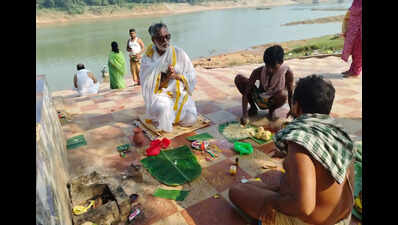ARTICLE AD BOX

Ramroop Jugurnauth performs funeral rites for his uncle, Dronacharia Jugurnauth, on the banks of the Baitarani river
Kendrapada: Mauritian civil servant Ramroop Jugurnauth, 64, arrived in Jajpur earlier this week on a personal mission — to trace his ancestral roots. This marks his fourth visit to Jajpur in pursuit of his lineage.
During the trip, he also fulfilled a solemn promise by immersing the bones and ashes of his late uncle in the Baitarani river.Jugurnauth, who is an HR manager in Mauritius police, possesses archival documents confirming that his ancestor hailed from Jajpur district. “My ancestor Jagannath Dash, coolie no. 352036, came to Mauritius in 1870 from a village in Jajpur. He never returned after completing his indenture period.
He chose to settle down and raise a family in Mauritius. Around 155 years later, I have come to pay tribute to him. He planted a tree, and I am just a leaf.
We are Brahmins, and our gotra is Shandilya,” said Jugurnauth.His uncle, Dronacharia Jugurnauth, passed away in 2022 at 82. “During the final days of his life, he advised me to immerse his bones and ashes in the sacred Baitarani river. Though he never visited Odisha, I fulfilled his wish last Friday at Siddheswar Mandir ghat and performed the funeral rites,” he added.
Jugurnauth began his search for roots in 1991 at the Mahatma Gandhi Institute Library and Archives in Moka, Mauritius. However, he has yet to locate the exact village or family. “Our family lost the Odia language, culture and traditions. But after 34 years of relentless search, I remain confident that I will one day reconnect with my long-lost family in Odisha,” he said.He has been moving from village to village along the Baitarani, determined to find his ancestral home.
“Many Mauritians have successfully traced their roots in India. I consider myself unlucky so far, but I hope this time it will be different. People in Jajpur are helping me in my mission. My wife and two daughters will soon join me to support the search,” he said.Reflecting on history, Jugurnauth said, “When slavery was abolished, the British colonial rulers of Mauritius turned to indentured labour from India to sustain the island’s development.
My family name is actually that of my migrant ancestor. It might have been different in India.”He also highlighted the significance of Nov 2, a public holiday in Mauritius commemorating the arrival of indentured labourers. “The ship ‘Atlas’ brought 36 Indian labourers to Mauritius on Nov 2, 1834. Between then and the formal end of indenture in 1910, over 4,50,000 Indians from various states crossed the Indian Ocean to Mauritius. From being ill-treated by the British, we gradually rose to take charge of our destiny.
Today, we hold pride and power in Mauritius. The struggle has been long and hard,” Jugurnauth said.

 2 hours ago
4
2 hours ago
4









 English (US) ·
English (US) ·